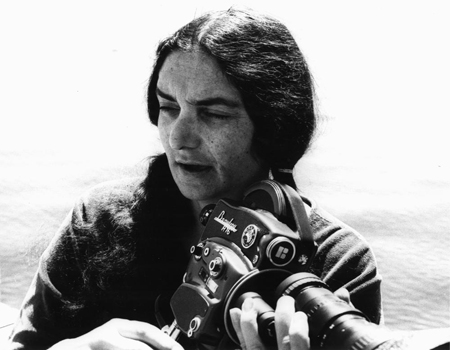Thursday, September 24, 2009, 6pm
Celebrated West Coast filmmaker Chick Strand passed away this past summer, leaving behind a body of sensual and smart work significant for its radical exploration of the space between documentary and poetry, truth and fiction, and the politics and pleasure of representation. A key figure in American independent and avant-garde film movements, she co-founded the film exhibition and distribution collective Canyon Cinema in the mid-1960s. She began her own filmmaking career at the age of 34, combining a background in photographic collage and academic training in anthropology into a series of poetic documentaries shot in Mexico while an ethnography student at UCLA. “Ethnographic films,” Strand once wrote, “should be works of art, symphonies about the fabric of a people.”
This evening, CATE pays tribute to Strand’s legacy with a rare screening of her 1979 film, Soft Fiction (16mm, b/w, sound, 54 min) which uses the ethnographic tool of the informant interview as a jumping-off point for a provocative and sensuous exploration of female sexuality and spirit, while raising questions about storytelling, memory, and the performance and preservation of self. For the critic Marsha Kinder, the Strand’s title “evokes the soft line between truth and fiction and suggests the idea of softcore fiction, which is appropriate to the film’s erotic content and style. It’s rare to find an erotic film with a female perspective dominating both the narrative discourse and the visual and aural rhythm with which the film is structured. Strand continues to celebrate in her brilliant, innovative personal documentaries her theme, the reaffirmation of the tough resilience of the human spirit.” Accompanied by the exquisite Kristallnacht (1979, 16mm, b/w, sound 7 min), an homage to Anne Frank and the resilience of the human spirit.
Born Mildred in northern California and nicknamed Chick by her father, CHICK STRAND studied anthropology at Berkeley in the 1960s, joined the free speech movement, and experimented with photographic collage. She joined the filmmaker Bruce Baillie and editor Ernest Callenbach to found Canyon Cinema, a screening and workshop collective that evolved into the San Francisco Cinematheque and the independent distributor, Canyon Cinema. She enrolled in the ethnography program at UCLA, and after graduating in 1971 taught for 24 years at Occidental College. She made nineteen films, many shot in Mexico, while traveling with her life and artistic partner, the pop-surrealist artist Neon Park (Martin Muller, 1940-93). Her work is held in the collection of the Academy of Motion Picture Arts and Sciences and continues to be distributed by Canyon Cinema.
More
